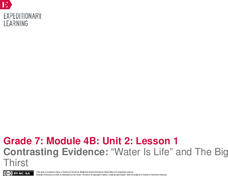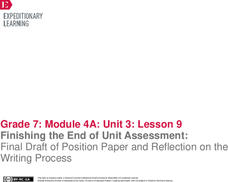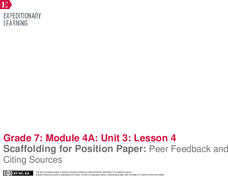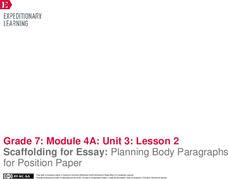EngageNY
Gathering Information about Water Management: Assessing and Reading Internet Sources, Day 1
It takes time to discover what makes a source accurate and credible. Using everything they've learned about source credibility, scholars begin researching supporting questions about how industry and agriculture manage water. They select...
EngageNY
Paraphrasing and Evaluating Sources: Pages 112–116 of The Big Thirst
Agriculture and water—it's a fine balance. So how exactly do industry and agriculture currently manage water? Pupils consider the question as they continue reading excerpts from Charles Fishman's The Big Thirst and adding notes to their...
EngageNY
Contrasting Evidence: “Water Is Life” and The Big Thirst
Sometimes differing arguments support the same claim. Scholars complete a graphic organizer comparing how two authors support the claim that people need to better manage the world's water supply. Pupils also complete a graphic organizer...
University of Minnesota
Writing for Success
You can be a success! Scholars learn skills required for successful writing with a step-by-step process. They begin with the basics of parts of speech, such as indefinite pronouns, and writing a simple sentence. Individuals then build...
EngageNY
Introducing Module 4B: “Water Is Life”
Learners take a gallery walk around the classroom to view various images and quotes. As they walk, they write down what they notice and wonder about what they see. After discussing their notice and wonder notes, they read the...
EngageNY
Final Performance Task: Sharing Visual Representations of Position Papers
Take note! Scholars use sticky notes to record information as they gallery walk to look at classmates' visual representations they created for their end of unit assessment. Learners then choose one word that represents the work they...
EngageNY
Finishing the End of Unit Assessment: Final Draft of Position Paper and Reflection on the Writing Process
Think about it. Writers think about their end of unit essays through reflection. They use the End of Unit 3 Assessment, Part 2: Reflection on the Writing Process handout to analyze the writing process they used to create their position...
EngageNY
End of Unit Assessment, Part 1: Revising Claims and Evidence Based on Feedback
Revisit, revise. Scholars receive their position papers returned with feedback from the teacher. They use colored pens to identify feedback related to the first two rows of the rubric and correct their papers based on the comments....
EngageNY
Scaffolding for Position Paper: Peer Feedback and Citing Sources
Scholars partner up for peer feedback of their position papers. After reviewing peer feedback guidelines, pairs take turns presenting their papers and completing a Peer Feedback Form. The class then has a mini lesson on MLA format.
EngageNY
Scaffolding for Essay: Planning Body Paragraphs for Position Paper
Let's make a plan. Scholars work on the plan for their papers using a Position Paper Planner. They talk with a partner about counterclaims and think about counterclaims to include in their papers. As learners begin to write, they work...
EngageNY
Mid-Unit Assessment, Part II: Research Task: Comparing and Contrasting Texts
When it comes to comparing texts, it's apples to oranges. As part two of the mid-unit assessment, learners compare and contrast two texts about the Internet and brain health. While reading, scholars use a Venn diagram to compare two...
EngageNY
Using Effective Search Terms: Researching Screen Time
The proof is in the reading. Scholars read an article, "Attached to Technology and Paying the Price," and answer text-dependent questions. Next, they complete a Venn diagram to contrast two authors' use of evidence on the topic of screen...
Teaching Tolerance
News Consumers' Bill of Rights and Responsibilities
Believe it or not, people have rights as new consumers. Scholars read PEN America's News Consumers' Bill of Rights and Responsibilities and work in small groups to paraphrase chosen sections of the text. Next, they create and present...
EngageNY
Using Multimedia in Presentations: Preparing to Present Claims
Time to wrap it all up! Using facts, details, and examples, pupils present their claims about whether the American Academy of Pediatrics should increase its screen time recommendations. They incorporate a multimedia visual display and...
EngageNY
Using Multimedia in Presentations: Preparing to Present Claims
Eye contact, volume, pronunciation are all parts of a great presentation. Scholars create visual displays to clarify the claim for an upcoming presentation about whether the American Academy of Pediatrics should increase its screen time...
EngageNY
Choosing a Position: Screen Time and Adolescents
Time to pick a side! Building on the Fishbowl activity from the previous instructional activity, scholars choose a position about whether the American Academy of Pediatrics should raise its screen time recommendations. Using notes,...
EngageNY
End of Unit 2 Assessment, Parts 1A and 1B: Fishbowl on Screen Time and Adolescents
Here's a surefire way to ensure that class discussions go swimmingly! Using the resource, scholars participate in a Fishbowl activity, forming two concentric circles in the classroom. As the group on the inside of the fishbowl discusses...
EngageNY
Forming a Research-Based Claim: Analyzing Risks and Benefits for Stakeholder
Welcome to the World Café, where lively debate is on the menu! Scholars participate in the World Café protocol, moving between discussion groups to decide if the American Academy of Pediatrics should increase its adolescent screen time...
EngageNY
Forming a Research-Based Claim: Introducing Stakeholders and Consequences
Consequences, consequences. Using the resource, scholars engage in a class discussion about the repercussions of too much screen time. Next, they create a Cascading Consequences chart that lists the positive and negative effects of...
EngageNY
Mid-Unit Assessment, Part 1: Tracing and Evaluating Arguments
It's test time! As part one of the mid-unit assessment, scholars complete a Tracing an Argument note-catcher for both a text and a video about the Internet's effect on the brain. Pupils demonstrate learning by evaluating the argument and...
EngageNY
Gathering Information about Screen Time: Assessing and Reading Internet Sources, Day 2
Calling all researchers! Using the resource, scholars continue conducting independent Internet research about a chosen research question. As they browse the web in search of articles to answer their questions, pupils paraphrase their...
EngageNY
Gathering Information about Screen Time: Assessing and Reading Internet Sources, Day 1
What's the best way to evaluate a source's accuracy and credibility? Pupils discuss the question with a partner and then share their ideas with the class. They also conduct Internet research, looking for an article that answers a chosen...
EngageNY
Evaluating Sources, Continued: The ONLINE EDUCA Debate 2009 (Part 2 of 10)
Watching videos and playing online games can be educational, but too much screen time has its drawbacks. Pupils watch a video about the topic and write down the claim, reasons, and evidence in support of reduced screen time for children....
EngageNY
Contrasting Evidence: “Games Can Make a Better World” and “Video Games Benefit Children, Study Finds”
Anecdotes, analogies, testimonies, statistics. The most powerful arguments rely on multiple types of evidence. Scholars explore the topic as they read contrasting evidence about the benefits of video games. They complete Venn diagrams to...

























